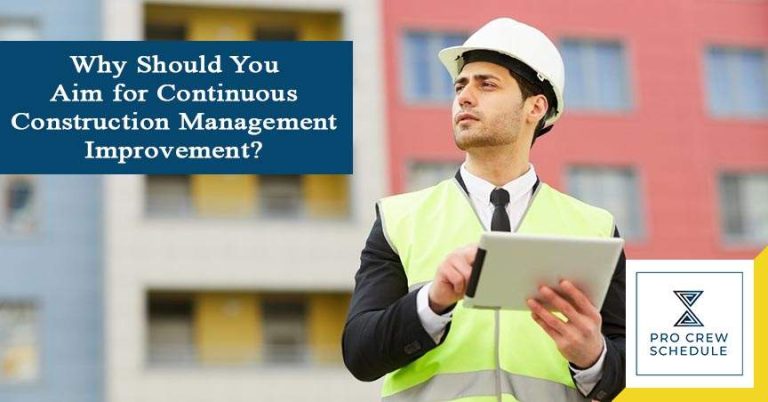In today’s evolving world, even experienced project managers are always looking for new ways to innovate and improve how they manage construction projects. An efficient, streamlined, and optimized construction management process can improve how long it takes to finish a project, how it progresses, and even how activities and tasks are done in the future. Many construction jobs go over time or budget, hurting everyone involved in the project – from the owner, contractor, subcontractor, and other trade partners. Improving how you manage your construction can help enhance critical parts of a project’s lifecycle and make it run more smoothly.
But managing construction does not always mean working more hours; instead, you should focus more on how to work smarter. This is why you should continuously strive for construction management improvement. From getting things done on time the first time to making the proofing process more accessible, reducing the amount of back and forth, and getting the work done on a budget, you can learn the right skills and techniques to increase employee productivity, lower costs, and be efficient at managing projects because changes often come up out of the blue in the field.
This article lists ten ways you can improve how you manage your construction projects. But first, let us define the basics of construction project management.
What is Construction Project Management?
Project management requires both technical construction knowledge and general management skills. As construction projects get more complicated, the position and responsibilities of the project manager keep growing. This might make it harder to ensure everything goes as planned, with any little mistake that can kill the project’s chances of success. Technological improvements such as construction automation, tools, and process management can help avoid critical and costly mistakes. In the next section, let us discuss the three phases of construction management.
What are The Three Phases of Construction Management?
Effective construction project management benefits owners by making it more likely that the project will be finished on schedule, within budget, and without financial or legal problems. Construction management is a professional service that uses specialized project management techniques to track how a project is planned, designed, and built. Even though project oversight changes as the project goes on, the goal of construction management is to make the most of best industry practices, wise management decision-making, and effective and transparent project controls and reporting methods. Construction management can be divided into three phases:
Pre-Construction Phase
Pre-construction is the first step in managing a project, including planning and organizing. The function of this phase is to make plans, processes, and budgets and decide how to use resources. As the first line of quality control for how the work is done, project managers require a lot of construction knowledge, technical know-how, and experience. Project managers will look at past projects’ successes and failures to ensure that the current project doesn’t repeat the wrong things and takes advantage of the good things.
As part of pre-construction construction management services, choosing a project delivery method and bidding on and hiring contractors are done. A good construction manager will look over the contracts to ensure that the obligations of the designer, the contractor, and the owner don’t overlap.
Construction Phase
The project management team must stay involved during the building phase to prevent surprises. By keeping a close eye on the submittal process, the construction manager can predict and avoid delays by ensuring the contractor orders, making long-lead-time items on time, and guaranteeing the trades are made correctly. Attendance at job meetings by the construction manager and regular reports are helpful ways to keep a project on track and avoid disagreements.
One of the team’s main jobs in this phase is to ensure that everyone goes according to what was planned during the pre-construction phase. A project manager should be able to stay on top of everything from project scheduling, construction inventory management, crew management, and administrative tasks.
Post-Construction
The job of a construction manager does not end when the work is done. Instead, support in the form of dispute resolution, contract close-out, getting and reviewing operation and maintenance manuals, overseeing punch list and warranty work, and talking to government officials to get temporary certificates of occupancy and certificates of occupancy are all beneficial to the owner at the end of the project, which is when it is most important. This is also the time to clear all pending punch lists and turn over the project to the client.
Why Should You Strive for Continuous Construction Management Improvement?
Some owners cut construction management expenditures to save on overhead, but it may cost them more in the long term. The owner can avoid costly conflicts and lawsuits by having an excellent project management team. Suppose a skilled construction manager is supervising. Before construction, a bad concrete pour or inappropriate steel connection can be caught early. If a problem isn’t recognized until after it occurs, fixing it can delay the project and be costly. The owner can expose conflicts, reduce modification orders, detect potential design problems, reveal poor building methods, and avoid claims by periodically reviewing construction activities.
That is why you should always strive for continuous learning, developing, and improving the way you handle your project. Working to get better all the time is the number one way that many businesses cut their operating costs. Continuous improvement, sometimes called “rapid improvement” is a Lean method for improving workflows, and it lets you set up efficient workflows that save time and money, so you can spend less time and effort on things that don’t matter.
A project manager needs to know how much it will cost to finish a project. Because of this, you need to know how long it takes to do different kinds of work. Using construction software, project managers can cut costs and avoid going over budget by predicting how the project will progress.
Seven Ways You Can Improve Your Construction Management Process
A property manager can only do so with management abilities and a tool to fulfill their responsibilities. Combining technical innovation and PMs’ project management skills can help complete the project efficiently. Having a streamlined and optimized construction process can revolutionize your project delivery system. Here are some strategies you can implement to improve your management processes.
Do Not Overcommit
Before the construction process starts, the company or the project manager must decide if they will take on the project. The project manager can determine if it is possible to take on a project by comparing its needs to the available resources. The project manager must consider the costs, materials, labor, and skills required to finish a task.
Prepare and Plan Accordingly
When a project manager takes on a job, a lot is on the line – time, effort, and money. You must constantly make a thorough and detailed plan before starting a project. It includes creating a budget, making a schedule, assigning tasks, setting deadlines, allocating resources, and figuring out how people should communicate. It makes an action plan that everyone on the team can use during the entire project delivery cycle. It serves as the framework that gives benchmarks to measure progress and ensure success.
Prepare Contingency Plans
The construction industry is inherently unpredictable because it can be affected by weather, natural disasters, late deliveries, and mistakes made by people. Project managers should always include contingency plans since something will almost always go wrong with a project. By planning for these costs and delays, the project manager will have less stress, and everyone involved will be happier. They also strengthen their process for managing construction projects by making projects run better.
Utilize Construction Technology
Even though construction projects are getting more complicated, technology in the construction industry has grown by leaps and bounds, and just in time. Construction tools can help the project manager with complex tasks and take time. An all-in-one project management solution will automatically keep track of all the schedules, inventory, resources, and documents.
Improve Communication and Collaboration
Miscommunication and low collaboration are a surefire way to lose a lot of productivity. Since you are working with many people, keeping everyone on the same page is critical in the project’s progress. Make it a habit to meet with your project supervisors daily to talk about what you want to get done that day and hear their thoughts on what they can do and what could go wrong.
Project Monitoring
Project management is not a one-step process; it is an ongoing process from the start of a project to its end. The project manager should always compare how the project goes to how it should go based on what was decided in the planning stage. This lets the project manager see where things are falling behind, figure out why, and take steps to fix the problem.
Document Management
Construction projects with many documents and reports can help project managers learn from mistakes they have made in the past. The best way for project managers to improve their construction management process is to look at the summaries of projects that went well and those that did not. History will always be the best way to learn.







